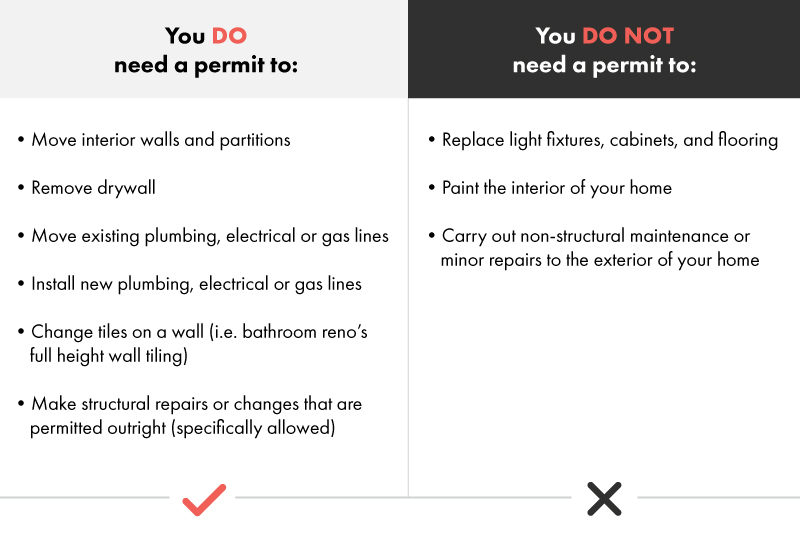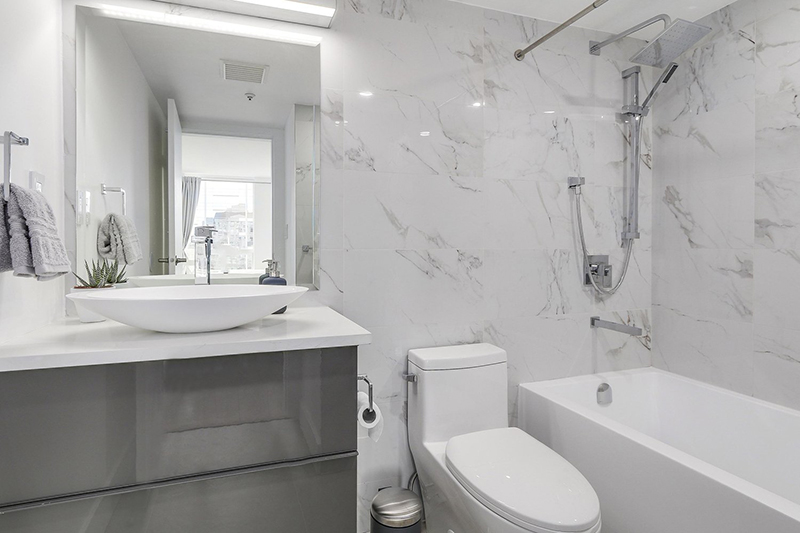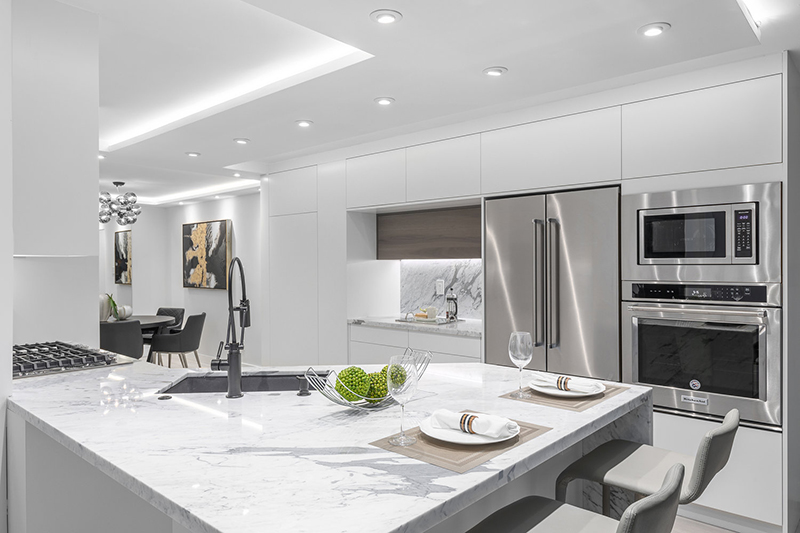If you’ve been planning to renovate your rental property but don’t know where to start, this guide is for you. There are many reasons why landlords may want to plan renovations: increasing their property’s value, attracting more renters, or simply making the unit more liveable. Today, we welcome the owner and head Project Manager of Vancouver’s Enzo Design Build, Meysam Pourkaram, for a guest post about what you need to know before tackling a renovation project, with liv.rent adding tips for how to ensure a smooth and successful renovation for you and your tenants. Enzo Design Build is a one-stop renovation, interior design, staging and construction management services company renowned for its quality, diverse skills and exemplary customer service.
Is your rental priced competitively?
Find out with a free rent estimate. Our team of rental experts will calculate your unit’s true value based on your listing details & current market trends.
Why should you renovate your rental property?
There are plenty of reasons why landlords would want to renovate their rental property – especially if you’re between tenants. Weighing the costs and potential benefits is key to making an informed decision when it’s time to renovate your property.
1. More revenue and more reliable tenants
The main reasons to renovate your rental property are to boost your rental rate and hopefully, attract more reliable renters willing to pay more and stay longer. Also, a newly renovated place typically makes for happier tenants who are less likely to leave thereby minimizing the costs related to tenant replacement (i.e. advertising, lost revenue when the property is vacant, not to mention the headaches and hassles of securing new tenants).
Also, by updating and renovating your property you will likely minimize maintenance issues down the road. For example, an old pipe could burst which would cost you as a landlord, inconvenience your tenants, and result in headaches as you seek compensation from insurance companies. If you act proactively and update plumbing, you can avoid these issues before they arise.
2. Improved aesthetics and design
Looks matter. A tenant wants to be able to visualize themselves cooking in the kitchen, primping in the bathroom and watching Netflix in the living room. You should try to create the perfect vision for prospective tenants. Especially if your unit is in an older building, you will likely want to invest in some updates to make your property as appealing as possible. Given recent government initiatives to build hundreds of new rental units, we recommend staying ahead of the game and making every effort to showcase your property in the best possible light.
3. Return on Investment
Renovations shouldn’t be considered a cost. They are an investment with a solid ROI. The ability to draw higher rents will also be attractive to a new buyer when it comes time to sell your property.
4. Tenant requests
Sometimes a renovation is the result of a request from a long-term tenant. Tenants may like to pitch in for the cost of a renovation in an effort to ensure it actually happens in a timely fashion and to their specifications. They will also be more inclined to stay and respect the space if their requests are heeded. Keep an open mind to their ideas. They are living in the space and have unique insight into how to make it more livable.
How do you prepare to renovate a rental property?
Before work can begin on your new renovation, be prepared to plan, plan and plan some more! Here are some tips from Enzo Design Build on how you can ensure a smooth renovation from the get-go, broken down by room:
Outside the house
If you own a single-family home or townhouse, pay attention to the front yard and entrance. You will want the first impression of the property to be a good one.
- Do some basic gardening and landscaping – cut the lawn and make sure the garden is well maintained.
- Consider adding planters or hanging baskets at the entryway to make your property look more inviting.
- Power wash walkways and stairs.
- Wash windows, gutters, mailbox and door.
- Remove clutter from the front porch.
Cleaning
The entire unit needs cleaning after a lengthy tenancy, but especially the kitchen and bathrooms.
- Hire a professional cleaner.
- Grease buildup in the kitchen may call for a strong detergent, such as TSP, for removal.
- Use liberal amounts of disinfectant cleaner in the bathroom. You may have to re-grout the tub/shower area.
- If your unit is carpeted, steam clean the carpets or replace altogether. Unless the tenants who just moved out were particularly conscientious, this is a must.
- Clean or replace curtains and window screens.
- Wash the windows – inside and out.
Painting
- Consider a simple coat of white paint throughout your property. It instantly brightens up the place and helps remove musty smells.
- Pro Tip: Elicit 2 or 3 painting quotes before you hire a painter.
- Or, learn how to paint to save money on painting in the future.
Floors
- Consider a floor restoration. Unlike a refinish, this doesn’t involve sanding off the finish. Instead, you merely scuff up the finish with a floor buffer and apply a refresher coat. It costs a fraction of what refinishing costs and can make a floor dulled by years of traffic look new again.
- Make sure all nails are hammered flat.
- Replace any broken tiles.
Appliances
Test and service all appliances.
- Make sure thermometers work
- Check water heater pilot
- Do a load of laundry to test washer and dryer.
- Clean dryer vents
- Test oven – turn it on to verify temperature on dial matches the thermometer inside the oven.
- Clean the oven. Most ovens are self cleaning but require hours to do – do it!
- Make sure all faucets are in working order. Check for drips, pressure, plugged drains. Repair if necessary.
Mould
Search for and eradicate mould. This is a serious health hazard and should never be ignored.
Look for mould in the following places:
- Basements or cellars, especially if flooding has ever occurred
- Underneath kitchen and bathroom sinks
- Underneath or behind refrigerators
- Behind walls that house plumbing (shower walls)
- Around air-conditioning units
- Around windows (especially single-paned ones)
Safety
- Provide a fire extinguisher
- Make sure fire and smoke alarms are working (i.e. check battery life)
- Consider installing carbon monoxide detectors (check strata and city by-law requirements)
Plumbing
Make sure there are no leaks.
- Check below sinks and tighten pipes if necessary.
- Check behind the base of toilets and tank.
- Tighten shower heads and handles.
- Ensure faucets are working properly. Tighten and/or repair if required.
Hardware
- Try all the drawers and cupboards and tighten hardware and hinges as required.
- If doors are squeaking, apply some WD40 to the hinges.
- Start planning as soon as possible. You don’t have to wait until the unit is empty. Be proactive and plan while you have it rented. It might take a month or 2 from time of demolition.
- If your rental property is a house you only need to contact the municipality as there is no strata involved. If, however, your unit is part of a strata, contact strata management and ask for renovation restrictions and requirements. If you choose Enzo Design Build, they will complete all the necessary documents and ensure requirements are met and changes are permitted by your Strata bylaws.
- Lock in your contractor as soon as possible
- Establish a budget and have a contingency plan
- Purchase the finishes in advance as they may sell out and this will delay your project. Some suppliers can put your products on hold for a while.
- Review the design and the finishes specs with your project manager and trades to ensure dimensions and specs match
- You or your contractor should contact the neighbors and let them know when you are starting the work. This will go a long way to avoiding discord with your neighbours and your strata.
- Make sure your contractors treat the building respectfully. Ensure they cover the common areas; this demonstrates you care about your neighbours and the strata; the courtesy will be appreciated.
When do you need building permits?
Before you can start any renovation, it’s imperative to make sure you’ve got the right permits in order. While not all renovations require permits, most major jobs will. Here’s a quick guide to when you’ll need to acquire building permits:

How long do renovations take?
Along with “how much does this cost?” this is one of the most common questions property owners have when it comes to renovations. Much depends on the scope of work. A lot of construction work has to happen sequentially, so be sure to allocate sufficient time. If you have the budget, get as much done as possible at once instead of in stages meaning if you can do the kitchen and bathrooms together, do so vs. waiting a year or two between.
For reference, here is a rough timeline of how long common renovations take:
- Painting and flooring a 600-800 sq.ft. condo can be done in about 5-6 days,
- For a custom kitchen in similar space, it will take at least 3 weeks to make and install cabinetry and appliances.
- For a full reno of a 1 bed 1 bath condo allow for up to 5 weeks.
- For a full reno of a 2 bed 2 bath condo, 6-8 weeks.
- For a basement, 4-6 weeks.

Who should you hire?
- A reputable renovation firm or design build firm.
- A renovator with local or national affiliations. Membership in organizations like Renomark and Havan provide peace of mind. Renomark identifies profession contractors who have agreed to abide by a strict renovation-specific code of conduct. Havan (Homebuiders Association of Vancouver) has a wide variety of resources available to those about to embark on a homebuilding or renovating project.
- Value the recommendations of family and friends. If they don’t have any, make sure you ask for references and then arrange to see previous project work.
- Hiring a renovation firm or tradesperson is like hiring any employee – look for professionalism, a good attitude, solid communications skills and excellent references.
- Follow up on references. Ask if you can see previous projects and talk to previous clients.
- Ask for a professional quote from 2-3 renovation firms and compare. Professionalism should extend to the quote. Look for a detailed breakdown of tasks and even a timeline.
- Insist on WCB coverage and minimum $2 million in liability insurance (ask for proof)
- Hiring a designer is highly recommended. Designers do much more than picking colours. They help you make smart, efficient decisions regarding use of space and materials.
- Conduct a deep dive on Google to unearth reviews of the renovation company, testimonials, images etc. Has the contractor and designer won any awards, Georgie, Ovation etc.?
- Keep in mind that a single person operation may be cheaper at the outset but it often costs more to fix their mistakes in the long run. Cheapest firms are not always the best.
- Get everything in writing!
What headaches can you anticipate?
- Despite best intentions and diligent planning, you should still be prepared for some surprises. For example, often after the demo takes place, new problems, challenges and work are uncovered so ensure you have some contingency funding available.
- Renos will be dusty. No one should be living in the place while they are underway unless the area is adequately sealed off from living space.
- It is best to remove furniture from the space. Do not stack it up near the work area.
- Strangers will be in and out of your place so remove all valuables.
- Even if you’ve been friendly and kept neighbors informed of renovation plans, there’ll likely be grumpy neighbors to contend with. Keep a level head, acknowledge their concerns and apologize.

How to successfully rent out a renovated property
Once your renovations are complete, it’s time to find new tenants to help cover the costs of your work. Thankfully, finding reliable renters is easy and stress-free with liv.rent’s all-in-one rental management features.
>> Recommended Reading: The Complete User Guide To liv.rent For Landlords & Property Managers
On liv.rent, landlords can post unlimited listings for free, taking advantage of features like video tours and eye-catching listing templates to showcase your new property upgrades. Once your listing is posted, tenants can apply directly through liv.rent where you can view their credit score, rental history, verified employment & income documents, and more with the Trust Score. This comprehensive tenant screening tool allows landlords to evaluate tenants’ reliability at a glance, with all the detailed information you need to make informed decisions and find the perfect renters, without the guesswork.
Here’s a short video on how to get started with your first liv.rent listing:


Rethink The Way You Rent
Not on liv.rent yet? Experience the ease of digital applications & contracts, verified tenants & landlords, virtual tours and more – all on one platform. Sign up for free or download the app.
Subscribe to receive the latest tenant & landlord tips and get notified about changes in the Canadian rental market.
>> Stay up-to-date on the average rent in Vancouver, Toronto and Montreal: Rent Reports.



0 Comments